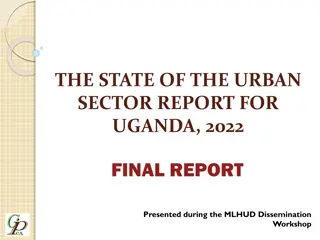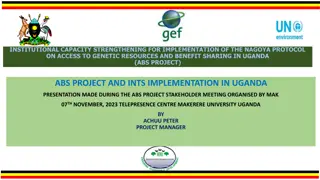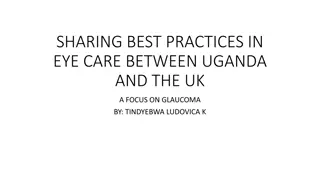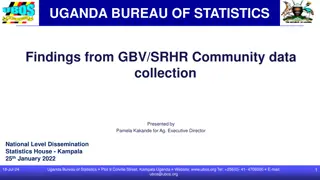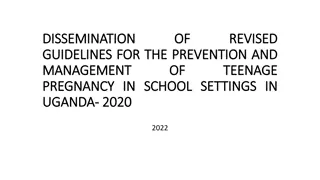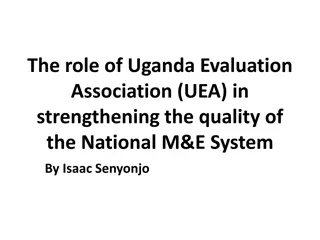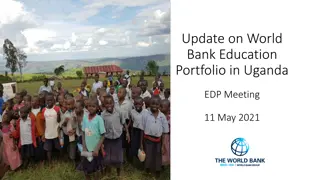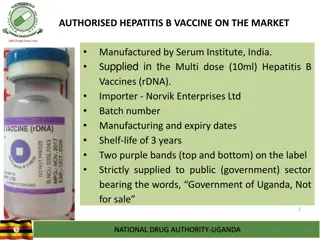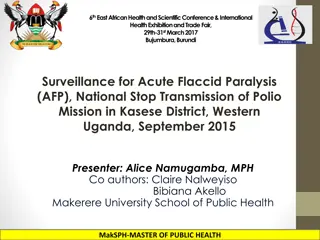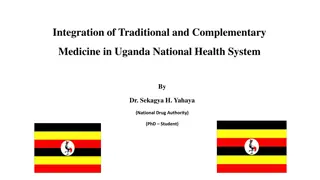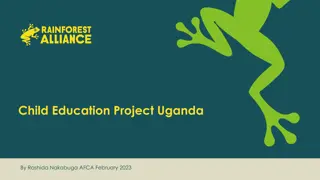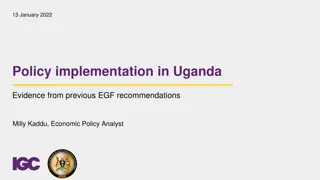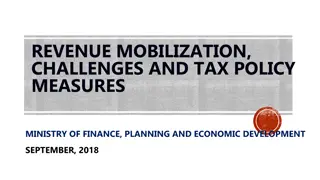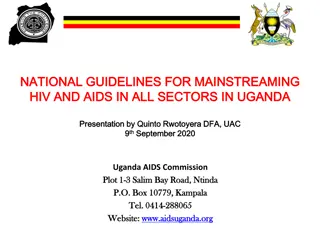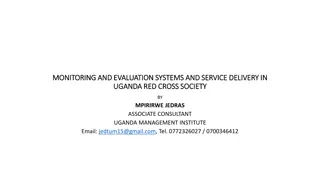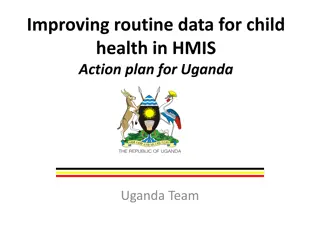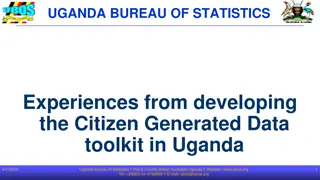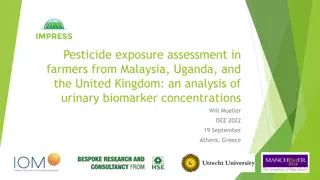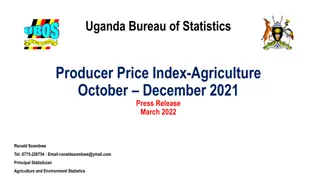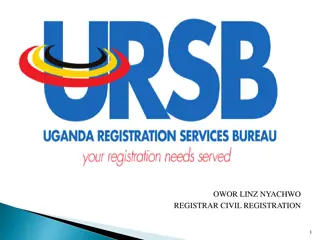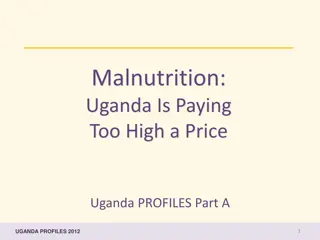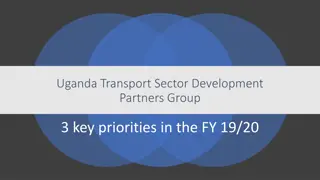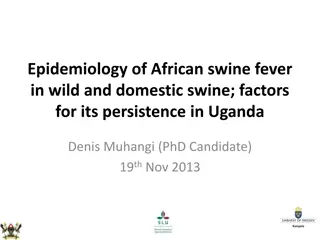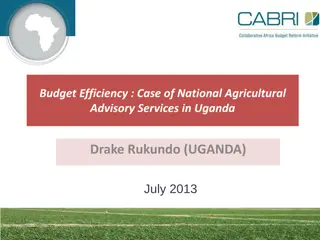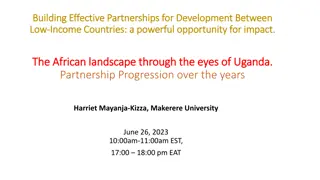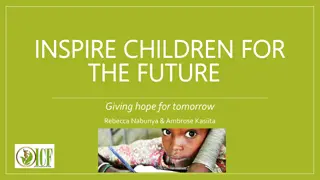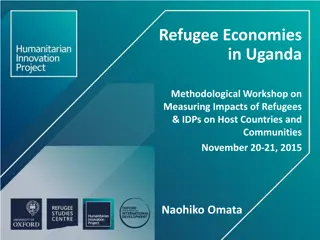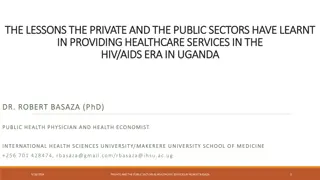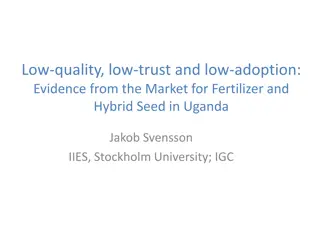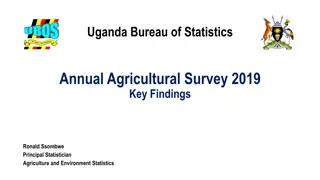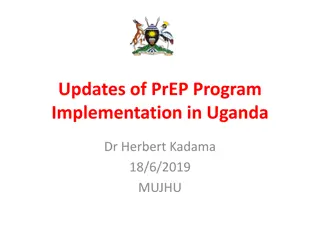National Smart Slum Upgrading and Prevention Strategy in Uganda
The National Smart Slum Upgrading and Prevention Strategy in Uganda addresses the challenges faced by slum residents, focusing on improving living conditions, preventing future slum growth, and integrating participatory measures for sustainable development. The strategy outlines the context of slum
0 views • 55 slides
Harnessing the Demographic Dividend for Uganda: Policy Brief
Uganda aims to transition into a middle-income country by 2040, facing challenges like high population growth and fertility rates. This policy brief advocates for interventions such as family planning services, health, education, and economic reforms to address these issues and promote sustainable d
0 views • 9 slides
Recent Judicial Decisions Impacting Uganda's Banking Sector
The judicial decisions regarding Uganda's banking sector, including issues like cryptocurrencies, digital fraud, bank valuers' liability, and property disputes, highlight crucial legal precedents and implications for both banks and customers. These rulings provide insights into the evolving landscap
0 views • 20 slides
The State of the Urban Sector in Uganda - 2022 Report Highlights
The report on the state of the urban sector in Uganda for 2022 outlines the challenges and opportunities arising from rapid urbanization. The goal is to inform policy interventions by identifying development issues, assessing governance strengths and weaknesses, and proposing sector strategies. The
1 views • 158 slides
The Anti-Homosexuality Act 2023: Impact on LGBTIQ+ Rights in Uganda
The Anti-Homosexuality Act 2023 in Uganda criminalizes homosexuality, imposing stricter punishments and curtailing freedom of speech for LGBTIQ+ individuals. Historical evidence shows that homosexuality is not alien to Africa, but colonial influences have led to stigmatization. The bill, first propo
3 views • 16 slides
Strengthening Institutional Capacity for Nagoya Protocol Implementation in Uganda
Uganda, known for its exceptional biodiversity and diverse indigenous ethnic groups, faces challenges of biodiversity decline and disappearing traditional knowledge associated with genetic resources. The Nagoya Protocol on Access to Genetic Resources and Benefit Sharing (ABS) presents an opportunity
0 views • 17 slides
Comparative Analysis of Glaucoma Management Practices in Uganda and the UK
Glaucoma, the 3rd leading cause of blindness in Uganda, is primarily managed by General Ophthalmologists across 20 hospitals in the country. Uganda lacks Glaucoma subspecialists and specialized nurses. Equipment availability varies among hospitals. Cases in Uganda are typically identified through re
0 views • 13 slides
Gender-Based Violence and Sexual Reproductive Health Research in Uganda
The Uganda Bureau of Statistics presented findings from a data collection on gender-based violence and sexual reproductive health in Uganda. The research covered topics such as child marriage, female genital mutilation, contraceptive use, physical violence, sexual violence, psychological violence, a
0 views • 30 slides
Guidelines for Managing Pregnancy in School Settings in Uganda - 2020-2022
Education is a fundamental factor for human development, with guaranteed rights in Uganda. The COVID-19 pandemic has worsened vulnerabilities, especially for adolescent girls, leading to increased teenage pregnancies. Specific districts in Uganda have been greatly impacted. Education for women and g
1 views • 38 slides
Strengthening Uganda's National M&E System through UEA Evaluation Strategies
Uganda Evaluation Association (UEA) plays a key role in enhancing the quality of the National Monitoring and Evaluation (M&E) System. The SWOT analysis reveals UEA's strengths, weaknesses, opportunities, and threats, while also evaluating the National M&E System in Uganda. The UEA's strategi
0 views • 33 slides
Implementing Curriculum Reforms in Under-resourced Contexts: Lessons from Uganda
Explore how Uganda is implementing curriculum reforms in under-resourced contexts to address the quality of education and graduate employability. The discussion delves into the challenges faced in the Ugandan education system, the introduction of a competency-based lower secondary curriculum, and a
1 views • 21 slides
Enhancing Education in Uganda: A World Bank Initiative
The World Bank's portfolio in Uganda focuses on addressing challenges in the education sector such as high dropout rates, declining learning outcomes, and limited access to education, especially for women and girls. The response includes initiatives to improve service delivery, strengthen equity, an
1 views • 18 slides
Hepatitis B Vaccines: Genuine vs Counterfeit - Insights from Uganda National Drug Authority
Explore the difference between genuine and counterfeit Hepatitis B vaccines in Uganda, as detailed by the National Drug Authority. Learn about the authorized vaccine on the market, counterfeit batch numbers, fake addresses on invoices/receipts, and the availability of vaccines in private sectors. St
0 views • 8 slides
Enhancing AFP Surveillance for Polio Eradication in East Africa
This presentation discusses the importance of Acute Flaccid Paralysis (AFP) surveillance in detecting poliomyelitis cases, with a focus on the National Stop Transmission of Polio Mission in Kasese District, Uganda. The goal is to eradicate poliovirus through strategies such as immunization campaigns
0 views • 12 slides
Integration of Traditional and Complementary Medicine in Uganda's National Health System
Dr. Sekagya H. Yahaya discusses the integration of traditional and complementary medicine in Uganda's health system, highlighting types of TCM applications, national policies and regulations, outdated acts of parliament that can be amended, standardization of TCM education, and initiatives to train
0 views • 8 slides
Uganda's Successes in Reaching Men with HIV Testing Through Assisted Partner Notification Program
Uganda has successfully implemented an Assisted Partner Notification (APN) program to reach men for HIV testing, addressing the gender gap in testing rates. By utilizing various approaches such as index testing, self-testing, and social network testing, Uganda has achieved significant success in tar
0 views • 12 slides
Tackling Child Labor in Uganda's Coffee Sector: A Project Approach
The "Child Education Project Uganda" led by Rashida Nakabuga aims to address the root causes of child labor in Uganda, particularly in the coffee sector. With a focus on poverty, gender inequality, and inadequate education, the project adopts a risk-based due diligence approach at the farm level to
0 views • 17 slides
Policy Implementation in Uganda: Evidence and Challenges
This research delves into the implementation of policies in Uganda with a focus on insights from previous Economic Growth Forum (EGF) recommendations. Analysts like Milly Kaddu and Ramathan Ggoobi highlight the importance of a dedicated policy on implementation. Methods for assessing policy progress
1 views • 12 slides
Uganda's Tax Policy and Revenue Mobilization: Challenges and Measures
The Ministry of Finance, Planning, and Economic Development in Uganda faces challenges in revenue mobilization and implementing tax policy measures. The tax policy aims to generate revenue for budget financing, promote investment and exports, redistribute income, and ensure compliance with regional
0 views • 22 slides
Mainstreaming HIV and AIDS in Uganda: Guidelines and Initiatives
The presentation by Quinto Rwotoyera from Uganda AIDS Commission discusses the national guidelines for mainstreaming HIV and AIDS in all sectors in Uganda. The content covers the existing policy and guidelines, overview of the presidential FastTrack initiative, objectives of the guidelines, users of
0 views • 28 slides
Monitoring and Evaluation Systems in Uganda Red Cross Society
The study examines the impact of Monitoring and Evaluation systems on service delivery in Uganda Red Cross Society. Despite having established an M&E system in 2006, challenges in service delivery persist. The purpose is to investigate the relationship between M&E systems and service delivery effect
0 views • 17 slides
Improving Routine Data for Child Health in Uganda: Action Plan and Trends
Enhancing child health data in Uganda through improved routine reporting and digital information systems is crucial for tracking progress and improving outcomes. Utilizing mobile technology for real-time reporting, harmonizing indicators, and engaging the private sector are key strategies identified
0 views • 11 slides
Strategic Growth Plan for Mamaland Safaris & Woodland Lodges in Uganda
January 2023 John Molson MBA International Case Competition presented a case on Mamaland Safaris & Woodland Lodges in Uganda. The challenge is to develop a growth strategy to achieve a 23% growth over the next 3 years. Analyzing the current situation, focusing on customer segments, acquisition metho
0 views • 33 slides
Enhancing National Statistics Through Citizen Generated Data in Uganda
Uganda's adoption of Citizen Generated Data (CGD) for informing policy-making and programming on gender equality and women's empowerment is highlighted. The Uganda Bureau of Statistics collaborated with various entities to develop the CGD Toolkit, emphasizing the importance of non-traditional data s
0 views • 23 slides
Pesticide Exposure Assessment in Farmers from Malaysia, Uganda, and the United Kingdom
This study evaluates the impact of pesticide exposure on farmers' health in Malaysia, Uganda, and the UK using urinary biomarker concentrations. Multiple cohorts are analyzed to assess associations between exposure-modifying factors and urine metabolite measurements. The IMPRESS project focuses on i
0 views • 12 slides
Uganda Bureau of Statistics Producer Price Index - Agriculture Overview
The Uganda Bureau of Statistics (UBOS) produces and disseminates the Producer Price Index Agriculture to show the farm-gate prices received by farmers for primary agricultural products. The index is used by various stakeholders for policy-making and decision-making purposes. It covers key agricultur
2 views • 26 slides
Addressing Nationality Issues in Uganda: Workshop Insights and Legal Framework
The workshop in Kampala, Uganda on May 2nd, 2018, highlighted the challenges related to the right to nationality. The discussions covered the legal framework, strengths, and gaps, as well as practical issues surrounding nationality in Uganda. Key issues include low birth registration rates, lack of
0 views • 14 slides
Civil Registration System in Uganda: Legal Framework and Responsibilities
The civil registration system in Uganda is governed by a legal framework including the Constitution, Registration Services Bureau Act, Children Act, and other laws. The Uganda Registration Services Bureau oversees the registration of vital events such as births, deaths, marriages, and adoptions. Reg
0 views • 23 slides
Addressing Malnutrition in Uganda: Challenges and Strategies
Malnutrition remains a critical issue in Uganda, with high rates of stunting, underweight, and micronutrient deficiencies among children and women. The National Development Plan aims to reduce poverty and improve health outcomes through strategies like increasing agricultural productivity and enhanc
0 views • 8 slides
Uganda Transport Sector Development Partners Group Priorities FY 19/20
This document outlines key priorities identified by the Uganda Transport Sector Development Partners Group for the fiscal year 2019/2020. The priorities include institutional framework optimization, legislative reforms, preparation of policy reports, and capacity-building initiatives within the tran
0 views • 6 slides
Epidemiology of African Swine Fever in Uganda: Insights and Challenges
African Swine Fever (ASF), caused by a large DNA virus, poses a significant threat to domestic pig populations in Uganda. Factors influencing its persistence include high mortality rates, absence of vaccines or treatments, and its endemic nature in Sub-Saharan Africa (SSA). Research aims to understa
0 views • 12 slides
Enhancing Agricultural Extension Services in Uganda: A Case Study of NAADS
The National Agricultural Advisory Services (NAADS) in Uganda is a decentralized and farmer-owned extension system aimed at improving food security and increasing farmers' incomes. This program focuses on providing farmer-centered advisory services to empower subsistence farmers and shift towards pr
0 views • 14 slides
Exploring Effective Partnerships for Development in Low-Income Countries: The African Perspective Through Uganda's Experience
Delve into the evolution of partnership progression in Uganda over the years, highlighting the transformative impact of collaborative efforts in the realm of global health education, HIV response, and research capacity building. Discover how initiatives like SANTHE-BMGF and CEBHA plus-BMBF are shapi
0 views • 10 slides
Empowering the Future: Inspire Children Project in Uganda
The Inspire Children project in Uganda, led by Rebecca Nabunya and Ambrose Kasiita, aims to empower vulnerable children through education, skills development, and community support. The project focuses on instilling hope, practical skills, and discipline in children for a brighter future. With a vis
0 views • 11 slides
Impact Assessment of Refugee Economies in Uganda - Research Workshop Highlights
This document outlines the methodological workshop on measuring the impacts of refugees and IDPs on host countries and communities in Uganda. It focuses on the Humanitarian Innovation Project's research in Uganda, emphasizing the role of innovation, technology, and the private sector in refugee assi
0 views • 11 slides
Lessons in Healthcare Services Provision in Uganda's HIV/AIDS Era
Dr. Robert Basaza discusses the lessons learned by the private and public sectors in providing healthcare services during the HIV/AIDS era in Uganda. Key insights include the formation of the Uganda AIDS Commission, multi-sectoral responses, and partnership coordination for an effective national str
0 views • 12 slides
Addressing Low Adoption of Modern Agricultural Technologies in Uganda
Market failures are hindering the adoption of high-yielding seed varieties and fertilizers by smallholder farmers in Uganda. Research suggests various constraints such as lack of information, credit, and insurance. A hypothesis is proposed, questioning if the technologies are not adopted due to adul
0 views • 35 slides
Uganda Bureau of Statistics Annual Agricultural Survey 2019 Key Findings
The Uganda Bureau of Statistics (UBOS) conducts an Annual Agricultural Survey (AAS) in collaboration with the Ministry of Agriculture to provide crucial data on agricultural production, land area, prices, market information, and technology adoption. The agriculture sector in Uganda is a significant
0 views • 16 slides
Agriculture and Fertilizer Business Insights in Uganda
Balton Uganda Limited, a subsidiary of Balton CP Group, operates in various Sub Saharan countries including Uganda. The company's departments cover Agriculture, Communication, Public Health, and more. The focus on Fertilizer Business in Uganda includes trends from 2011-2013, distribution channels, m
0 views • 19 slides
Updates of PrEP Program Implementation in Uganda by Dr. Herbert Kadama
Uganda has been proactive in implementing oral PrEP as a key biomedical prevention intervention since December 2016. Dr. Herbert Kadama, on June 18, 2019, provided updates on the progress of the PrEP program in Uganda. The country has developed a comprehensive road map for PrEP implementation, cover
0 views • 16 slides



